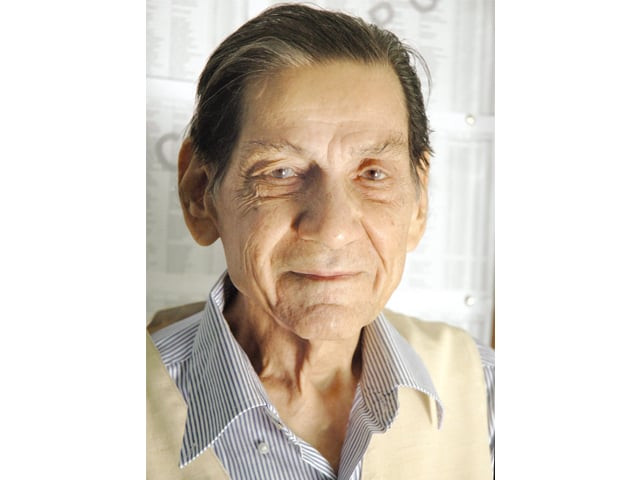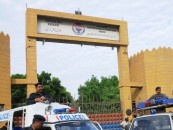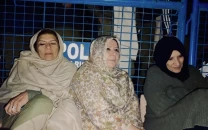Iconic fighter for press freedom dies
Legend of the Pakistani print media, Minhaj Barna passed away on Friday morning.

The current vibrancy and defiance of Pakistan’s media owes a lot to the past struggles of a few leaders of the journalist community. Prominent among these iconic leaders was the name of Minhaj Barna.
Journalism suffered a great loss when Barna, 85, a veteran journalist, trade union leader and poet, passed away at a private hospital of the federal capital in the small hours of Friday. A patient of duodenum ulcer for long, he had undergone surgery last Friday and was since struggling for his life. He is survived by a daughter, Afshan Sardar, and his youngest brother, politician Meraj Mohammed Khan besides hundreds of friends and admirers.
He was laid to rest at the Racecourse Graveyard in Rawalpindi. A large number of journalists, trade union leaders and political workers attended the funeral to pay their last homage to their iconic leader.
Born in 1925 to a conservative Rohilkhand Pathan family in Ahmadabad, Gujrat, Barna’s family originally belonged to Qaimganj in the Farrukhabad District of Uttar Pradesh.
After his early education in Ahmadabad, Barna moved to Bombay where he worked as a teacher. He then went to Delhi where he worked at the Jamia Millia, and did his graduation from there. He then joined the Communist Party of India (CPI) to fight against British rule.
His youngest brother, Meraj Mohammed Khan came from Karachi on Friday to attend his brother’s burial despite his own failing health. The family settled first in Quetta and then moved to Karachi.
Barna started his career as a journalist after a master’s degree from Karachi University. He worked for Urdu daily Azad, moved to Lahore to work for daily Imroze and later as a correspondent for the Pakistan Times. He had several stints abroad – including as the London correspondent for Associated Press of Pakistan. His last assignment was as a Press Counsellor in New York during Benazir Bhutto’s first stint as prime minister. He also worked for Islamabad-based English language daily, The Muslim, as its bureau chief in Karachi
Barna was elected secretary-general and President of the Pakistan Federal Union of Journalists (PFUJ) in 1969. He was also the founding chairman of the All Pakistan Newspaper Employees Confederation (APNEC).
He also played key role in the historic 10-day nationwide strike spearheaded by his senior comrades, such as Israr Ahmed and K.G. Mustafa, which culminated in the Newspapers Employees Services Condition Act, one of the acts of the 1973 Constitution safeguarding the rights of journalists.
His progressive leaning kept the PFUJ in constant conflict with the establishment, in particular when he was its general secretary and later president. It was around that period when he went on the longest hunger strike that any leader of any party or group had ever observed. It caused his health grievous harm.
Barna was a man of commitment and action who remained true to his cause to the very end of his life. “Years of struggle and protracted illness had not blurred his vision. It was a moving experience when I last heard him at a function of SAFMA not so many months ago,” said columnist Mushir Anwar.
“Quite a few Rohilkhand Pathans of Qaimganj achieved distinction as accomplished wielders of both the sword and the pen. Some of them may have abandoned soldiery for academics but they never gave up fighting. Foremost among them in the modern period stands Dr Zakir Hussain, the builder of the Jamia Millia, Delhi, one of the greatest Muslim achievements in the subcontinent, where Minhaj Barna spent some of his formative years. Nobody should therefore be surprised to see a book of verse by a man who for long years was identified as the battleship of Pakistan’s journalist community.” This is how eminent journalist I.A Rehman put it while reviewing his poetic collection in Books & Authors magazine of Dawn.
“The level of respect PFUJ and APNEC earned in late seventies till early nineties was because of the sheer dedication, commitment and remarkable leadership of Barna sahib and Nisar Usmani sahib, which would never be regained,” remarked senior journalist M. Ziauddin.
During General Ziaul Haq’s dictatorship, remembered for its oppression and flogging of journalists, Barna led a historic resistance by the media.
He also contributed poetry as a chronicle of the various phases of democratic struggle.
Published in The Express Tribune, January 15th, 2011.



















COMMENTS
Comments are moderated and generally will be posted if they are on-topic and not abusive.
For more information, please see our Comments FAQ